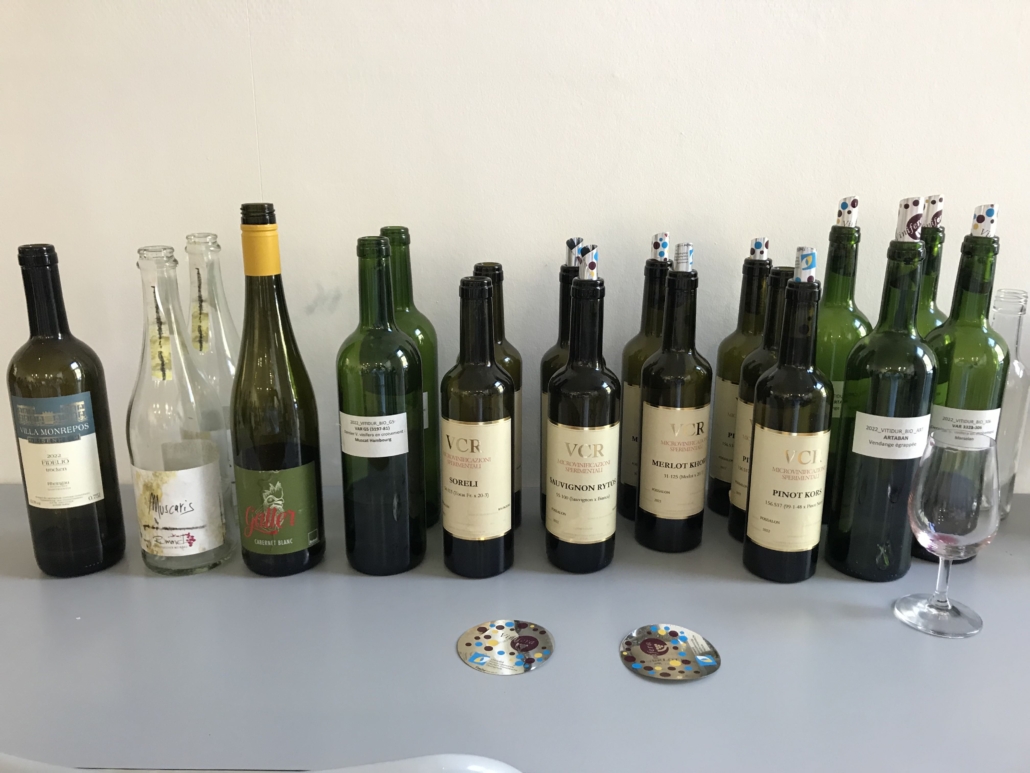The viticulture realm is currently undergoing a revolution driven by grape varieties that can endure common vineyard diseases and the challenges posed by climate change. Recently, students from Vinifera EuroMaster were given the unique opportunity to sample wines made from novel resistant grape varieties developed by leading institutions such as INRAe France, Geisenheim University, Germany, and Vivai Cooperativi Rauscedo (VCR) Italy – Vinifera Euromaster associate partner -.
These resistant grape varieties boast distinctive characteristics:
- A high-quality aromatic and polyphenolic profile comparable to the parent V. vinifera.
- Robust agronomic and oenological profiles with strong resistance to fungal diseases and environmental stresses.
- Significant disease resistance, leading to reduced reliance on phytosanitary treatments, thereby cutting costs.
- Promotion of highly sustainable vineyard practices, ensuring environmental conservation.
- Meeting consumer demands for top-quality, health-conscious wines.
The prevalence of fungal diseases like powdery and downy mildew has historically necessitated the heavy use of chemical fungicides or copper sulphate, causing substantial environmental and health repercussions. For over 40 years, researchers have worked on developing alternative solutions through the cultivation of resistant varieties.
The creation of these new resilient hybrids involves crossbreeding various grape varieties with strong disease-resistant genes. These grapes undergo small-batch vinification to evaluate their aroma and taste profiles. Subsequently, once these varieties pass quality assessments, they are introduced into the commercial market.
In France, the process for registering, classifying, and planting these grape varieties involves a meticulous series of steps:
Step 1: Varieties must meet specific criteria for inclusion in the official catalogue, supported by distinct, uniform, and stable (DUS) attributes along with agricultural, technological, and environmental value (VCUS test results). Registration is formalized through governmental orders based on recommendations from the Technical Committee for Plant Breeding (CTPS) – vine section. Upon meeting DUS test standards, breeders may seek protection via Plant Breeder Rights.
Step 2: Registered varieties are then classified as either table or wine grapes based on their VCUS results, following government orders upon recommendations from FranceAgriMer committees and the Technical Committee for Plant Breeding (CTPS) – vine section.
Step 3: Authorization for planting is granted only for classified varieties, requiring vineyard owners to obtain approval before planting vines, aligning with France’s management system for the total national vine production potential.
INRAe, the French National Research Institute for Agriculture, Food, and the Environment, is at the forefront of grapevine research. Varieties like G 5 3197-81, Artaban, Resdur, and Var 3328-306, developed at the institute, were tasted by the students. Notably, Resdur stands out by integrating multiple disease-resistant genes within the vine.
Students also had the opportunity to taste micro-vinified wines from new varieties like Soreli, Sauvignon Rytos, Merlot Khorus, and Pinot Kors developed by VCR. These grapes symbolize Italy’s commitment to sustainability while offering a diverse array of flavors.
Geisenheim University provided students with a unique opportunity to taste Fidelio, Muscaris Sparkling, and Cabernet Blanc. These grapes exhibit remarkable resilience against diseases, presenting a wide range of tastes and styles.
To explore these advancements further, you can visit the respective websites of INRAe, Vivai Cooperativi Rauscedo and Geisenheim University for more information.
https://www.vivairauscedo.com/en/
https://www.hs-geisenheim.de/en/
Subject to copyright






